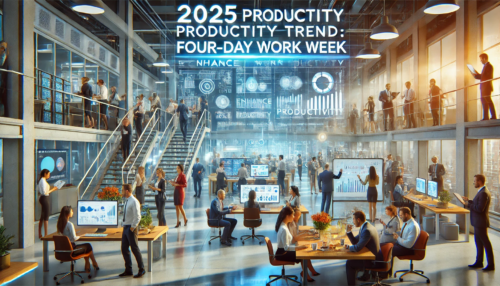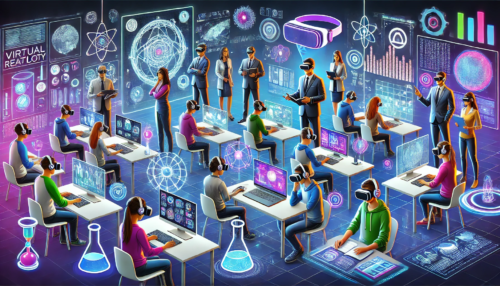Reskilling Boom: The Adult Education Revolution
Online platforms offering micro-degrees for career shifts.
Have you ever felt like your career path was set in stone, only to realize you need a dramatic change in direction? In 2025, countless adults around the globe are finding themselves in exactly that spot—confronting rapid technological shifts, global market fluctuations, and a complete rethinking of what it means to build a fulfilling career. Enter the reskilling boom, an adult education revolution that’s rewriting the rulebook on how we learn, retrain, and transition into new professions.
Oh, and did I mention micro-degrees? These are bite-sized, laser-focused certificates offered by online platforms, designed to help you pivot fast. If you’re short on time and big on ambition, micro-degrees might be the magic key. Let’s wade into all the excitement, political debates, generational perspectives, and a dash of celebrity endorsement that have turned adult education into something both thrilling and occasionally messy.
Why Adult Education Is Under the Spotlight
Back in the day, you’d pick a degree in your early twenties and ride that career wave until retirement. That’s so 1990s. Times have changed, with the World Economic Forum’s Reskilling Revolution Initiative predicting that over a billion people worldwide will need retraining by 2030. The reasons span from AI’s rapid encroachment on routine jobs to entire industries evolving so fast that today’s skill sets risk becoming obsolete tomorrow.
I recall chatting with a friend who jumped from being a sales rep to a data analyst after taking an eight-week micro-degree course online. They used to dread spreadsheets; now, they juggle big data like it’s second nature. This shift isn’t just some random anecdote—it’s part of a larger trend. As detailed in a Jaro Education blog, upskilling and reskilling are crucial responses to job market changes.
Government Notes—Policies and Funding Streams
What about the government angle? In 2025, plenty of national budgets are earmarking funds specifically for adult education. Some countries provide tax incentives for businesses that invest in employee retraining. Others have introduced partial or fully subsidized micro-degree programs for unemployed or underemployed adults. A few highlights:
- Education Vouchers – In certain regions, unemployed workers receive “reskilling vouchers” they can use on approved e-learning platforms.
- Adult Education Councils – New government bodies are popping up to coordinate policies, ensuring that micro-degree courses meet industry standards.
- Transnational Collaboration – Cross-border agreements, especially within the EU, promote a unified framework of credential recognition, making it easier for folks to pivot careers internationally.
Still, the politics can get muddy. One side hails these measures as the solution to unemployment and skill gaps, while some critics worry about the privatization of education or the digital divide that might leave low-tech communities behind.
Political News—A Tangle of Debates and Proposals
Over the last couple of years, politicians and policy wonks have squabbled (as they do) about the best ways to manage this adult education boom. In a sensational televised debate, one politician declared that government should fully fund all micro-degrees, citing adult learners as key to national competitiveness. A more conservative voice retorted that free access might cause surges in “low-quality certificate mills,” diluting the value of accredited programs.
Influential bodies like the Pew Research Center have weighed in, reminding us that strong oversight and robust public-private partnerships are essential. The bottom line? Everyone agrees that people need new skills. Disagreements arise on who pays the bill and how to keep quality high.
Spotlight on Research Labs & Scientists
It’s not just politicians and educators jumping in—scientists and research labs are busy dissecting how the adult brain tackles new skills. Some cognitive scientists suggest that older learners benefit from bite-sized lessons, with repeated intervals and plenty of practical exercises. Others note that adult brains crave real-world context—something micro-degree platforms often excel at, linking lessons directly to industry tasks.
Emerald Insight published studies showing that well-designed online courses can outperform traditional lectures in terms of retention, provided they incorporate interactive modules and community-building forums. Meanwhile, ed-tech labs experiment with AI-driven tutors, adaptive learning algorithms, and even VR-based simulations for advanced fields like robotics or biotech. A friend of mine once tested a VR lab for micro-surgery techniques—he said it felt surreal, but unbelievably helpful for building muscle memory.
The Role of Micro-Degrees—Fast, Flexible, and Future-Ready
Micro-degrees are like that perfect espresso shot—concentrated, quick, and energizing. They typically cover a focused skill set or topic, for example:
- Data Analytics Basics – 6 to 8 weeks for a working knowledge of SQL, Python, or data visualization.
- Digital Marketing Essentials – Short courses that dissect SEO, social media ads, and brand-building in under three months.
- Renewable Energy Fundamentals – Tailored modules on solar, wind, or green hydrogen technologies for those pivoting into eco-friendly careers.
Platforms like Disco offer curated course lists, while major MOOC providers (think Coursera, edX) also increasingly brand their certificate programs as “micro-master’s” or “professional certifications.” Because these credentials hone in on actionable skills, you can theoretically finish a program and apply for relevant roles immediately—no four-year time sink required.
It’s not all unicorns and rainbows, though. Some fields still require deeper, more traditional degrees, and not all micro-degrees are created equal. That’s why research labs emphasize accreditation and outcome tracking, ensuring that new credentials stand for something tangible, not just a fancy PDF on your wall.
Celebrity Endorsements—Glitz Meets Education
Who would have predicted that celebrities known for red-carpet glam would back adult education? A certain A-list actress famously enrolled in a micro-degree program to expand her philanthropic work, sharing her progress (and struggles) on social media. Another big-name musician, known for philanthropic endeavors, financed thousands of scholarships for adults from disadvantaged backgrounds to enroll in online programs focusing on coding or healthcare.
On talk shows, these famous figures gush about how adult education can empower mid-career folks who’ve faced layoffs or want personal growth. Sure, some cynics say it’s just a marketing move. But you can’t deny the power of star wattage in shifting public perception. When a revered pop star says, “Learning never stops,” fans might reconsider hitting that “Enroll” button themselves.
Older Learners—A Tapestry of New Hopes and Old Doubts
Let’s face it: for those who’ve spent decades in a single profession, stepping into an online course can feel like climbing Everest. Some older learners worry they’re “too set in their ways.” I remember my aunt, who spent 25 years as an office manager, diving into a micro-degree on project management. She told me she feared she’d be the oldest student in her cohort. But guess what? She discovered that many were in their 40s, 50s, or beyond. She formed unexpected friendships, gleaned fresh career ideas, and built a portfolio that helped land her a new role.
Socially, older people sometimes complain that digital platforms cater to younger folks, ignoring the fact that older adults need user-friendly interfaces and supportive communities. With governments pushing inclusive policies, we’re seeing more platforms introducing “buddy systems” where learners of all ages can partner up for study sessions. That sense of belonging helps break down generational barriers.
Youth Perspectives—A Seamless or Overwhelming Shift?
Now, flipping to the younger crowd: they’re practically glued to their devices, right? So you’d think micro-degrees and adult education (yes, some 20-somethings are still adult learners) would be effortless. Not always. Younger folks face their own uncertainties. Many have degrees that haven’t quite panned out, or they’re juggling side gigs to repay student loans. Taking on another course might feel like a leap of faith.
Nevertheless, micro-credentials often appeal to the digital-native generation. Instead of waiting to climb a slow corporate ladder, they can pivot swiftly. The LinkedIn Pulse article about lifelong learning highlights how Gen Z sees continuous skill upgrades as standard protocol, not an exception. This generation is less squeamish about changing direction because the entire job market looks like a kaleidoscope—always morphing.
Emotional Twists and Social Complexity
It’s not unusual for people to wrestle with internal conflicts: “I’m excited to learn something new, but am I a failure for leaving my old field?” or “I love the flexibility of online classes, but I miss the face-to-face camaraderie.” If you’ve had those thoughts, welcome to the club. The adult education revolution has an emotional undercurrent. On one hand, it’s liberating to know you can pivot at almost any age. On the other, it can be jarring to realize your old skill set no longer cuts it.
Culturally, some communities still hold onto the notion that a “real education” must be a multi-year slog in hallowed institutions. Micro-degrees, in their view, seem suspiciously short. Over time, as more success stories pile up, that skepticism might fade. Or perhaps new forms of gatekeeping will arise—human nature is complicated that way.
Political Side Effects—Too Good to Be True?
Some critics allege that governments champion these bite-sized credentials to mask bigger economic problems. They point out that offering micro-degrees doesn’t solve entrenched issues like stagnant wages or skyrocketing housing costs. It’s easy to roll out a shiny initiative touting “30,000 new online learners” without confronting deeper structural inequalities. Indeed, multiple nonprofits have demanded that governments pair reskilling programs with labor protection laws, living wages, and fair hiring practices.
If you skim social media, you’ll see the debate in real time: “Reskilling is crucial for a strong economy,” one user comments. “But are we just distracting from crumbling social safety nets?” counters another. Possibly both. Politics, as always, is messy. We can only hope that adult education programs become more than just a band-aid.
Top Online Platforms Changing the Game
Let’s highlight some major players in the micro-degree realm, each offering its own spin on adult education. (Remember to check for genuine accreditation or partnerships with recognized institutions.)
- Coursera: Partnered with top universities for “MasterTrack” certificates—think specialized modules in business analytics or user experience design.
- edX: Similar approach, with “MicroMasters” in fields like supply chain management and cybersecurity.
- Udacity: Known for “Nanodegrees,” particularly in tech fields like machine learning and autonomous systems.
- Skillshare: A more creative focus. Short, skill-based classes on topics like graphic design, copywriting, or photography.
- Disco: Offers curated directories to the best upskilling platforms, as described in their complete guide.
Remember, the perfect course depends on your goals, budget, and learning style. Some programs are expensive but come with robust career support. Others are cheap or even free but might lack personalized feedback.
Social Aspects: Networking and Community
Adult education isn’t just about picking up new skills in solitude. Most platforms provide discussion forums, Slack groups, or live webinars where you can meet people from diverse backgrounds. It’s not uncommon to find a 50-year-old professional from Argentina studying next to a 22-year-old freelance designer in Singapore. This cross-pollination of ideas brings intangible benefits—cultural insights, mentorship across generations, or simply moral support on tough days.
Many platforms encourage project-based assignments so you can show off real-world applications of what you’ve learned. In group projects, you might stumble upon your next business partner or a lifelong friend. Or you might have that awkward moment where time zones clash and everyone’s grumpy in the Zoom meeting—life is unpredictable, after all.
Looking Ahead—Trends, Forecasts, and Dreams
As Jaro Education suggests, the future of work is about continuous learning, not a one-and-done educational model. By 2030, we might see more official partnerships between large corporations and micro-degree providers, offering stackable credentials that lead to advanced roles. Some optimists predict that governments will recognize these short-term programs on par with certain vocational schools, bridging the gap between formal and informal learning.
We could also witness a surge in AI-driven mentorship. Imagine an intelligent system scanning your coursework, tracking your performance, and suggesting custom next steps. Some find that exciting; others worry about data privacy. Then there’s the dream of fully immersive VR-based micro-degrees—like stepping into a 3D simulation to practice medical procedures or run a virtual factory. A wild ride, indeed.
FAQs
Q1: Do micro-degrees actually help me get hired?
Yes, if they’re accredited or partnered with recognized industry players. Employers often value the practical projects you create during these programs.
Q2: Are micro-degrees only for tech fields?
No. While tech courses are popular, you’ll find micro-credentials for marketing, project management, healthcare, finance, and even creative arts.
Q3: Can older learners adapt to online platforms easily?
It depends on the individual, but many platforms now offer user-friendly interfaces and mentorship to support learners of all ages.
Q4: Are governments worldwide subsidizing adult education?
Policies vary. Some countries strongly fund reskilling; others rely on private sector initiatives. Check your local government websites for grants or vouchers.
Q5: How do I pick the right micro-degree?
Reflect on your career goals. Look up course reviews, check accreditation, and evaluate time commitment vs. potential outcomes.
H2: Further Reading & Links
- Emerald Insight Research on Adult Learners
- Jaro Education – Upskilling in a Changing Job Market
- Disco – Guide to the Best Upskilling Platforms
- Pew Research Center – The Future of Jobs & Training
- LinkedIn Pulse – Lifelong Learning & Career Paths
- World Economic Forum – Reskilling Revolution

A Final Nudge Toward Your Next Step
All said, the reskilling boom in adult education is shaking things up. Whether you’re 25, 45, or 65, the prospect of learning new skills—on your own time, at your own pace—can be downright thrilling. You might feel a mix of curiosity, excitement, and maybe a dash of anxiety. That’s natural. Embracing change can get messy, but it can also spark incredible growth.
If you’re itching to explore new possibilities, consider browsing a few of the platforms mentioned above or investigating government-sponsored voucher programs in your region. You could discover a new passion or launch a career that better aligns with your life’s ambitions. Remember, it’s never too late to invest in your evolution.
Looking for more inspiration?
- Sign up for our newsletter to receive curated updates on emerging micro-degree courses, government grants, and success stories.
In this age of swift change, one thing’s for sure: Adult Education is no longer a back-burner issue—it’s front and center in reshaping how we work, grow, and flourish.




